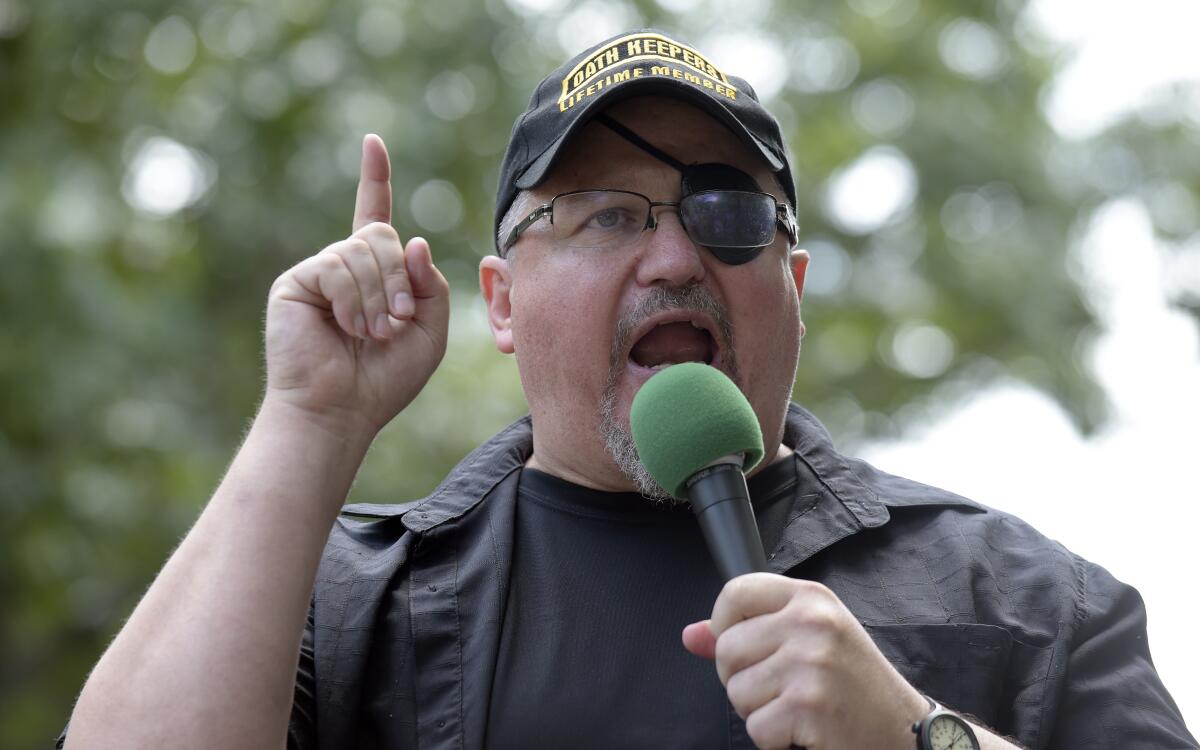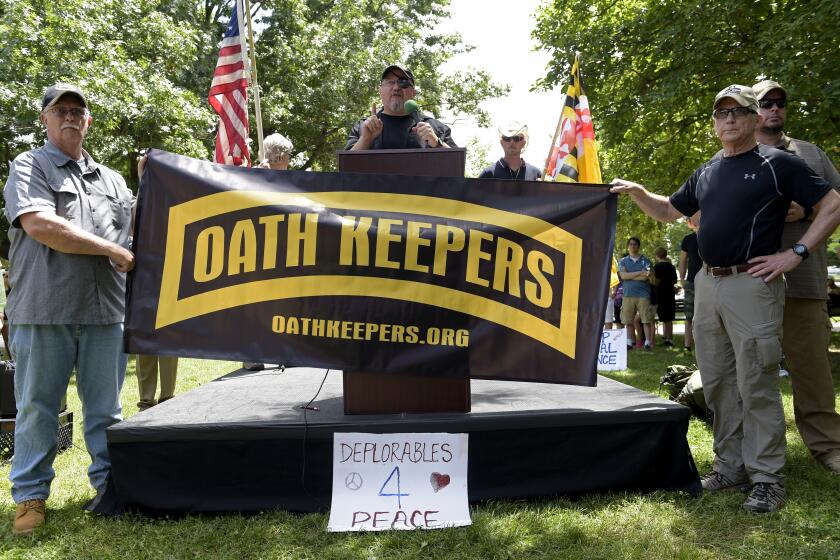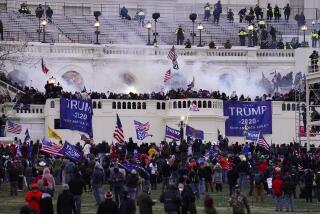Column: A jury delivers the truth about Jan. 6. It was seditious conspiracy

The conviction of Oath Keepers leaders Stewart Rhodes and Kelly Meggs on charges of seditious conspiracy is a historic legal victory for the Department of Justice, but it is much more than that as well.
Tuesdayâs verdicts in federal court in Washington will go a long way toward defining the Jan. 6, 2021, Capitol melee, once and for all, as a heinous, purposeful crime orchestrated by enemies of democracy.
The Justice Department richly deserves a victory lap for its efforts. Seditious conspiracy is a notoriously difficult charge to prove â the last successful prosecution was in 1995 â and it has a checkered history in the department.
In fact, it was only after contentious internal debate that the department greenlighted the charges in Jan. 6 cases as righteous and winnable.
Even so, only Rhodes and Meggs were convicted on the sedition count. All five of the defendants were found guilty of obstructing a government proceeding, but none was convicted on all the various charges the government brought.
The conviction hands the Justice Department a major victory in its prosecutions surrounding the Jan. 6, 2021, attempt to overturn President Bidenâs win.
For some observers, the mix of verdicts tempers the governmentâs victory. Thatâs the wrong way to look at it.
The prosecutorsâ focus was always first on convicting Rhodes, and to a lesser degree Meggs, of seditious conspiracy.
On all the other counts and with the other defendants, the juryâs meticulous evaluation of the various charges â accepting some, rejecting others â only bolsters the credibility of their decisions. The lack of a clean sweep shows that the jurors exercised independent judgment; they didnât simply swallow the governmentâs case whole. And all the defendants were convicted of serious charges carrying the potential for significant jail time.
Tuesdayâs decisions will have immediate, practical legal ramifications. First, those still to be tried for their involvement in the Jan. 6 riot, including Proud Boys and additional Oath Keepers, may want to think hard about pleading guilty and offering to cooperate with the government investigation.
The verdicts also cast a shadow over anyone who consorted with the conspirators in the days after the 2020 election. Perhaps the most obvious example: Roger Stone, whose encrypted messages with Rhodes were a key part of the evidence at trial. (Rhodes messaged Stone right after Joe Bidenâs victory: âWhatâs the plan? We need to roll ASAP.â)
The founder of the militia group Oath Keepers, Stewart Rhodes, was once a promising Yale Law School graduate.
More generally, the convictions represent a major advance in the Department of Justiceâs pursuit of accountability for all those involved in efforts to prevent a peaceful transfer of power. Now more than ever, the department is all in on treating the riot as the existential danger it was.
That means a no-stone-unturned approach to the role of political officials in the scandal, and in particular to the investigations that are now in the hands of special counsel Jack Smith, which mainly involve Donald Trump and his circle.
The practical and legal effects of the landmark result are only a fraction of the import of the convictions.
Some of the countryâs most prominent political leaders continue to embrace a ludicrous narrative that minimizes the events of Jan. 6. In their twisted telling, the riot was a legitimate political protest that got a little out of hand or even, in the words of Trump himself, represented courageous acts of patriots who have been treated unfairly by the Justice Department.
The same denial of reality underlies the announced resolve of the new Republican majority in the House to investigate the Jan. 6 committee, as if that body has been engaged in an illegitimate examination of political trivialities.
To understand who the Oath Keepers are and what they believe, here are three important things to know about the organization.
Tuesdayâs verdicts offer a decisive rebuttal to these preposterous accounts and one that is far more effective than the protestations of political opponents, law professors or op-ed columnists, however well reasoned.
A jury trial represents our systemâs ideal of authoritative fact finding, a process enshrined in the Constitution for getting as close as a society can to the truth of a matter that is in dispute. And the jury in this trial plainly took its duty seriously and exercised its power with meticulous attention to detail.
That doesnât mean that the whole country will agree to call Jan. 6 a criminal conspiracy, but the holdouts are suddenly swimming against a stronger current.
The effect of these guilty verdicts, in a trial conducted with thoroughness and care, will be to marginalize the apologists for Jan. 6. They canât help but look more and more like wingnuts or monsters now, inveighing against what a critical mass of society has accepted and denying a juryâs account that squares with what the whole country saw in real time.
That goes for history as well. The Oath Keepers convictions (and the other sedition prosecutions) will be among the rare trials â perhaps one or two a generation â to appear in high school history books. And what future students will learn is that the trials mattered deeply because they vindicated the truth about Jan. 6, 2021.
More to Read
A cure for the common opinion
Get thought-provoking perspectives with our weekly newsletter.
You may occasionally receive promotional content from the Los Angeles Times.














